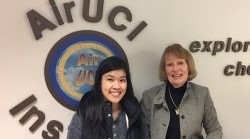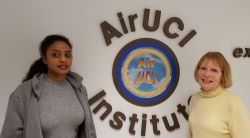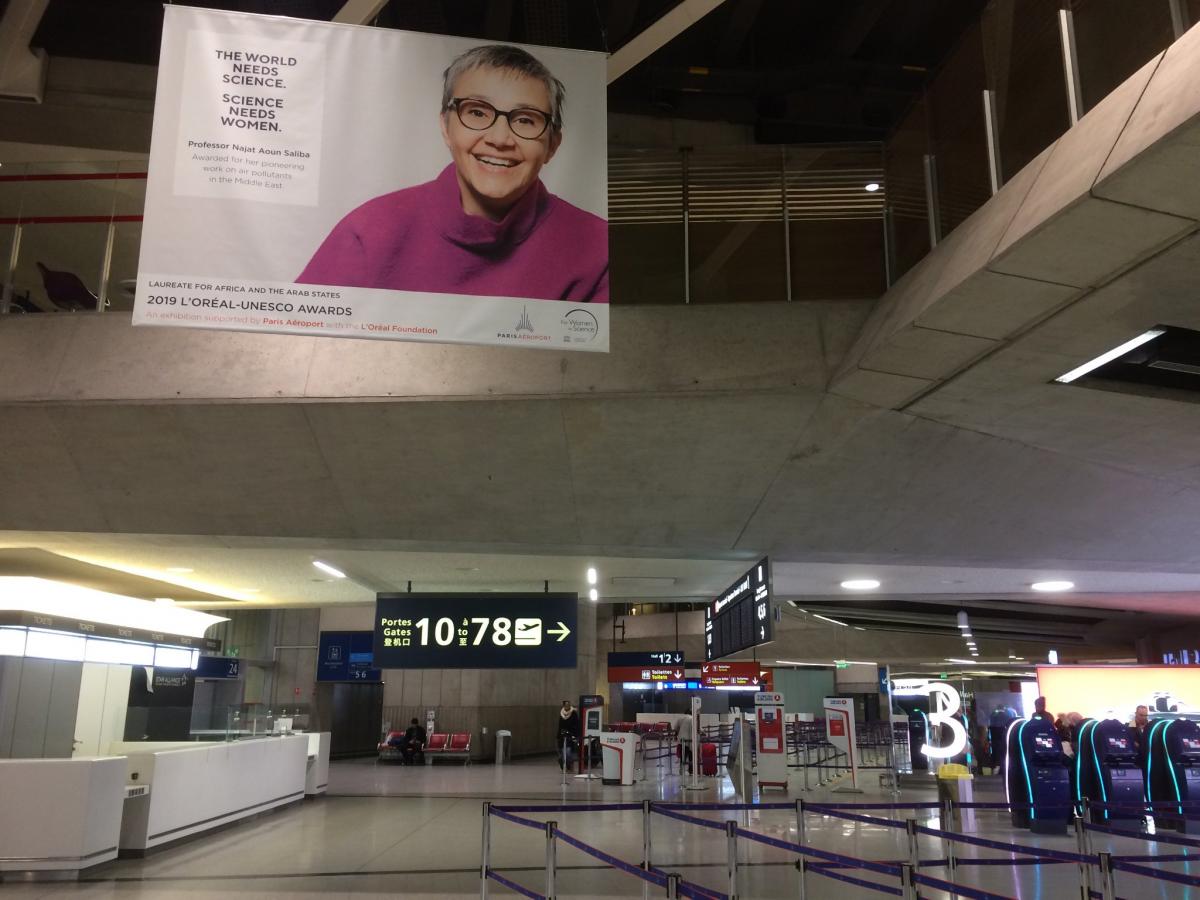This Wednesday evening, April 10th, PBS will premiere their new documentary entitled Ozone Hole: How We Saved the Planet at 7 pm Pacific Time (possibly 10 pm – check your TV schedule). In Los Angeles and Orange Counties, it will be broadcast on Channel 50, KOCE. The program documents the background, discoveries, and solutions to the problem of CFCs accumulating in the atmosphere and endangering the planet. The research of Sherry Rowland and Mario Molina is highlighted, and the issue is presented as a successful outcome in the environmental protection movement, one of the "wins" that show that we can accomplish positive change in our efforts to preserve the planet.
News
Here's the latest news from AirUCI — our events, our people, our science.
2019
It was announced today that Doug Tobias, one of the original founding members of AirUCI, has accepted the position of Chair of the Department of Chemistry at UCI, effective July 1, 2019. Congratulations, Doug!
AirUCI faculty Manabu Shiraiwa has been selected as an Environmental Science & Technology and ES&T Letters Early Career Scientist. The publication highlights 24 young scientists in the field of environmental science and included him, citing his studies of terbuthylazine and its heterogeneous reactions with OH. The Shiraiwa research group conclude that the shielding effects of the surface can extend this herbicide’s atmospheric lifetimes from a few days to a few weeks, a finding that has implications on the long-range transport of this potentially toxic compound. ES&T created a virtual issue on March 21st, 2019 to acknowledge the achievements of these young scientists. Read the article
AirUCI is pleased to welcome Prof. Kim Fortun and Prof. Michael Fortun as new faculty in our institute. Both are professors in UCI's School of Social Sciences, Department of Anthropology (where Kim serves as Chair), with research interests in air pollution and its effects on human health. We look forward with great anticipation to their contributions and collaborations in the work of AirUCI.
On March 2nd, 2019 AirUCI intern Anton Ni participated in Part 1 of the Orange County American Chemical Society's Chemistry Olympiad exam. His was the highest score and his team from University High School placed 4th among 45 Orange County high schools. 160 students took the Part 1 exam and the average score was 33.2 — Anton's score was 58! Only 13 of the 160 participants qualified to take the national test on April 27th.
Anton is also captain of the team from University High School that is going to the finals of the U.S. Department of Energy National Science Bowl in Washington DC. After intense competition at NASA's Jet Propulsion Laboratory in Pasadena on January 26, 2019, their team beat out more than 20 other high schools to advance to the finals, which will be held in April. Anton, who is the son of Weihong Wang in the Finlayson-Pitts research group, has worked in our labs the past two summers and at his young age has contributed to published scientific journal articles. Way to go, Anton!
AirUCI Collaborator Jean-Francois Soussin of the Laboratoire Inter-universitaire des Systèmes Atmosphériques sent us the photo below this morning. It shows a banner hanging inside Charles De Gaulle Airport in Paris with the image of longtime AirUCI collaborator Najat Saliba of the American University in Beirut! Najat has just received the International Award for Women in Science, making her the first Lebanese-based researcher to win the award, presented annually by UNESCO and L'Oreal Cosmetics. "For 20 years I've been working silently in my lab trying to raise awareness of women's achievements in science... this award will help bring that hard work into the light," she said. Way to go, Najat!
AirUCI faculty Manabu Shiraiwa was accepted into the 2018 "Make Our Planet Great Again" initiative that was launched by French President Emmanuel Macron in response to the U.S. withdrawal from the Paris Climate Accords. The program was intended to attract non-French scientists to go to France and "work together on concrete solutions for our planet". Manabu applied, was accepted, and spent a very productive month in 2018 working on computer models to study formation of SOAs in air. Now Manabu is one of four "MOPGA" scientists profiled in an article in Chemistry World, which details his research and the experience of working with new collaborators in France and beyond. Read the article
AirUCI faculty Scott Samuelsen's APEP group conducted a research project on how ordinary households interact with electricity and smart devices, and this study is cited in an article at CalMatters.org about energy usage, the power grid, privacy concerns, and options available to address these issues. Scott has concerns that while the adoption of smart home devices is growing fast, regulation and consumer protections that should accompany them are not keeping pace. “The market is out of control with respect to regulation (of devices),” Scott said. “We are in a free-for-all.” Read the article
AirUCI faculty Ralph Delfino has retired from UCI's School of Medicine and is leaving our institute. We appreciate his years of participation with AirUCI and wish him well in his future endeavors. Thanks so much, Ralph!
The 2019 recipients of the Jim Pitts Undergraduate Memorial Award are Nehal Idris and Hillary Nguyen, both Chemistry majors set to graduate in June, 2019. Nehal stood out among the nominees for her determination and persistence in pursuing her education despite many obstacles. A native of Sudan, growing up in Saudi Arabia, she overcame discrimination, language barriers, and the challenges of her socioeconomic status, and she will now be pursuing a Ph.D in Chemistry.
Hillary also overcame obstacles in her study of chemistry. She is a first-generation college student for whom chemistry was initially quite challenging, but she spent extra time and worked very hard to master course material. She also plans to pursue a Ph.D in Chemistry with the goal of synthesizing natural products that have medicinal impacts.
This award is given annually in honor of the late James N. Pitts, legend in Atmospheric Chemistry and longtime AirUCI team member. Congratulations, Hillary (at left) and Nehal!




